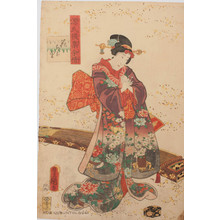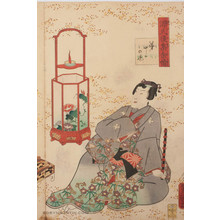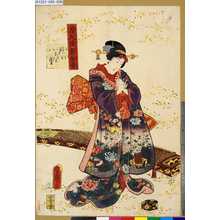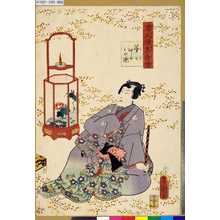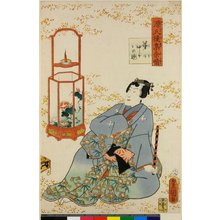Japanischer Druck "Chapter 11 Hana-chiru-sato" von Utagawa Kunisada
Künstler:Utagawa Kunisada
Titel:Chapter 11 Hana-chiru-sato
Datum:1858
Details:Mehr Informationen...
Quelle:Robyn Buntin of Honolulu
Durchsuchen aller 4.310 Drucke...
Beschreibung:
This diptych is from a series "Genji gosh� yoj�" ( Lasting Impressions of a Late Genji Collection) consisting of 38 diptychs and 1 single sheet in the �ban format. The series was published from about the end of 1857 until the 6th month of 1861, or even later, but not in a numerical order. Each diptych presents a full-length figure clad in gorgeously decorated robes standing or sitting against a white background with sprinkled gold and silver dust. The motifs are faithful reproductions in colour of the black-and-white illustrations of the novel "Nise Murasaki Inaka Genji", written by Ry�tei Tanehiko and illustrated by Kunisada published in 1829-42, a parody of Lady Murasaki Shikibu's classic "Tale of Genji." Tanehiko's version of Genji was written in less formal Japanese, and the plot revolves around the hero, named Mitsuuji, who is in search for stolen heirlooms belonging to the Ashikaga family. The work was a runaway best-seller, prompting a boom in �Genji' publications, plays, fashions and other paraphernalia, all featuring Mitsuuji (the character based on Prince Genji of the original novel) with his trademark �lobster-tail' topknot. Because of the enormous popularity of Tanehiko's new version, single print series were produced in large numbers in order to satisfy the demand of the growing audience. "Genji gosh� yoj�" is a particularly luxurious edition, as each chapter of the tale is represented on a diptych and various complex printing techniques such as blind printing, printing with gold and silver, as well as brilliant colour are applied. The prints in this particular set were kept in an album protected by kiri wood covers, so the colors have remained bright and beautiful. Timothy Clark, British Museum curator's notes. Gallery of NSW, Asian Art Department notes. Andreas Marks, The Clark Center for Japanese Art and Culture.
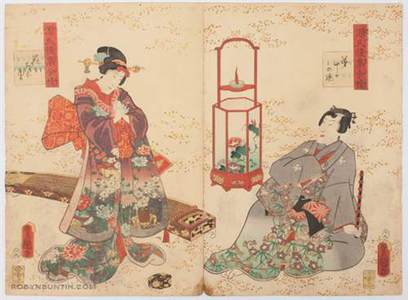
![Ch. 11, Hanachirusato, from the series Lingering Sentiments of a Late Collection of Genji (Genji goshû yojô) [pun on The Fifty-four Chapters of the Tale of Genji (Genji gojûyojô)] Japanischer Druck "Ch. 11, Hanachirusato, from the series Lingering Sentiments of a Late Collection of Genji (Genji goshû yojô) [pun on The Fifty-four Chapters of the Tale of Genji (Genji gojûyojô)]" von Utagawa Kunisada, 歌川国貞 (Utagawa Kunisada I (Toyokuni III))](https://data.ukiyo-e.org/mfa/thumbs/sc167967.jpg)
![Ch. 11, Hanachirusato, from the series Lingering Sentiments of a Late Collection of Genji (Genji goshû yojô) [pun on The Fifty-four Chapters of the Tale of Genji (Genji gojûyojô)] Japanischer Druck "Ch. 11, Hanachirusato, from the series Lingering Sentiments of a Late Collection of Genji (Genji goshû yojô) [pun on The Fifty-four Chapters of the Tale of Genji (Genji gojûyojô)]" von Utagawa Kunisada, 歌川国貞 (Utagawa Kunisada I (Toyokuni III))](https://data.ukiyo-e.org/mfa/thumbs/sc223106.jpg)
